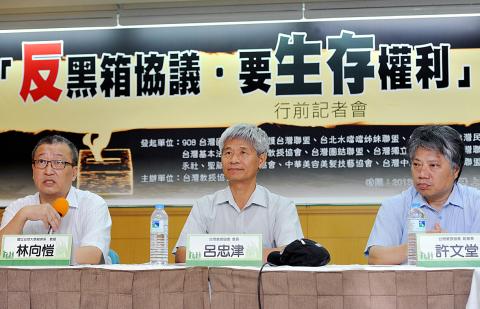|
Civic groups to rally
against ¡¥opacity¡¦ of service trade pact
By Chris Wang / Staff reporter

Taiwan Association of University
Professors president Lu Chung-chin, center, and two association members call on
supporters to protest against the cross-strait service trade agreement at a
press conference in Taipei yesterday.
Photo: Chien Jung-fong, Taipei Times
Civic groups yesterday said they are
planning to protest against the ¡§opaque¡¨ cross-strait service trade agreement on
July 27 to express their concerns about the negative impact the pact may have on
people¡¦s livelihoods.
The groups said the rally will be held on Ketagalan Boulevard in front of the
Presidential Office. The organizations involved include the Taiwan Association
of University Professors (TAUP) and several pro-independence groups, including
the Hakka Society, the Northern Taiwan Society, the Taiwan United Nations
Alliance, the Alliance of Referendum for Taiwan and the 908 Taiwan Republic
Campaign.
Since it was signed without first conducting a comprehensive impact assessment
and with no transparency, the pact may harm thousands of local businesses and
millions of workers, and jeopardize national security, TAUP president Lu
Chung-chin (§f©¾¬z) said.
¡§The people of Taiwan can do nothing except express their anger and opposition
to the pact on the streets since the government just ignores them,¡¨ Lu told a
press conference.
Lu said the groups are demanding that the government renegotiate the pact with
Beijing.
National Taiwan University professor Kenneth Lin (ªL¦V·_) proposed holding daily
demonstrations of between 5,000 and 10,000 protesters in front of the
legislature in Taipei when lawmakers review the pact in an extra session, which
is set to begin on July 29.
Three years after the Economic Cooperation Framework Agreement (ECFA) was
signed, Taiwanese have finally realized that only a select few have benefited
from the pact, while the majority have been suffering from its negative effects,
Lin said.
¡§There is no better time to ask for a renegotiation or a suspension of the
service trade agreement than now,¡¨ he said.
Lin said that the free-trade pact with New Zealand was different from the ECFA
and the service pact in terms of the impact it would have on the nation.
The opening of service sectors to Chinese investment would have larger negative
impacts than opening up agricultural sectors to New Zealand because of the
similarities between Taiwan and China in language and culture, he said.
|
![]()
![]()
![]()